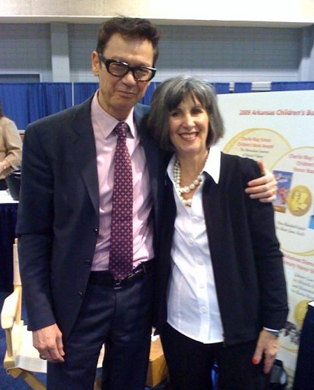
In his award-winning series of books about Joey Pigza, an 11-year-old with attention deficit hyperactivity disorder, author Jack Gantos created a character from his childhood memories of boys like Joey.
Gantos, also the author of the Jack Henry and Rotten Ralph series of books for children as well as books for adolescents and adults, is one of three featured speakers at this year’s Literacy Symposium sponsored by the University of Arkansas. Gantos and writing and reading specialists Ruth Culham and Valerie Ellery will speak June 17-18 at the fifth annual symposium at the Fayetteville Town Center. Cost and registration information is available online on the College of Education and Health Professions Web site.
"As a child I attended 10 schools in 12 grades," Gantos explained in a phone interview recently. "I lived in multiple neighborhoods, and when you move a lot you find out quickly that it's very hard to break into the core group of kids. So, who else do you find yourself with but the Joeys, the kid with the desk in the hallway, the kid that is pretty smart but goes all over the place."
Joey narrates the books, giving readers a perspective into the mind and heart of a child with ADHD.
"We get to see the interior landscape, the emotional landscape," Gantos said. "Most of the time, people see the physical landscape, the acting out."
The Boston-based author receives about 3,000 letters a year from readers, including parents, teachers and children. The letters from children with ADHD frequently ask him, "How did you know I feel that way? How did you know it's like that for me?
He explained that, when children first read a Joey Pigza book, they often "ride the action" and focus on Joey's crazy home life or antics such as putting his finger in the pencil sharpener and jumping from a barn but then, as Joey gets help and the book shifts to Joey's emotional interior, the youthful reader begin to see more deeply into Joey's character.
Even with Gantos' insight into the thought processes of a child with ADHD, the books wouldn't work, he said, without a mix of humor and drama.
"The humor gives an escape from the drama," he said."It's a pretty daunting task to be Joey Pigza. If it wasn't for the humor, the story would be too harsh, and kids like Joey have a great sense of humor so it wouldn't be realistic, either."
Gantos typically spends a couple of months in the spring and again in the fall traveling the country talking to students and teachers about creative writing and literature. The rest of the year he writes.
Gantos will talk with educators attending the symposium in Fayetteville about both the content and structure of writing. His three-hour session is titled "Everybody Loves a Story." In his sessions with students and teachers, Gantos brings one of his childhood journals as well as what he calls spy maps of his neighborhood he sketched showing where things happened and drawing in other characters.
"Giving someone a blank sheet of paper and saying, 'Here, tell your story,' is really hard for them to do. I give them ideas about making it a more friendly operation. Drawing the map and characters helps the writer physically get a sense of the story, and visually the story can soon be translated into words on the page."
He goes on to discuss structural components of writing such as beginning, middle and end and character, setting, problem and resolution.
Stories need a double ending, both a physical and an emotional ending, for a transformation to take place, Gantos said, using as an example the beloved 1968 children's book, Corduroy, about a teddy bear in a department store that's missing a button on his overalls.
"Even in Corduroy, he gets a button (the physical) but also finds a friend (the emotional). Without the emotional aspect, the ending wouldn't be meaningful. Kids want that humanity, that connection which makes literature grow inside of them."
Contacts
Heidi Wells, director of communications
College of Education and Health Professions
479-575-3138,